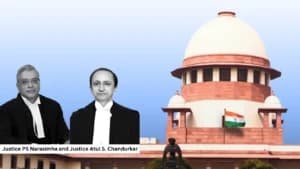The Supreme Court of India recently expressed shock over the Haryana Police's inhumane treatment of an accused who was not only handcuffed but also chained to a hospital bed while under detention. The Court declared such actions a violation of fundamental rights under Article 21 of the Constitution and directed the Haryana Government to issue strict guidelines to prevent such misconduct in the future.
The case in question involved Vihaan Kumar, who was arrested under various sections of the Indian Penal Code, including fraud and conspiracy. His arrest was challenged on the grounds that he was not informed of the reasons for his detention, violating Article 22(1) of the Constitution.
Read Also:- Violation of Judicial Orders: Is Imprisonment the Only Solution? Supreme Court's Important Interpretation
The case in question involved Vihaan Kumar, who was arrested under various sections of the Indian Penal Code, including fraud and conspiracy. His arrest was challenged on the grounds that he was not informed of the reasons for his detention, violating Article 22(1) of the Constitution.
“The right to live with dignity is a fundamental right under Article 21 of the Constitution. The act of chaining an accused to a hospital bed is an outright violation of this right.” - Supreme Court
During the hearing, the Supreme Court was presented with photographic evidence showing that Vihaan Kumar was handcuffed and his legs were chained to the hospital bed. Upon inquiry, the Medical Superintendent of PGIMS admitted that the accused was indeed chained while under medical care.
Read Also:- Supreme Court Overturns High Court Order Mandating Security Guards at All ATMs
Taking serious note of this treatment, the Court stated:
“Before we part with this judgment, we must refer to the shocking treatment given to the appellant by the police. Such illegalities must never be repeated.”
In response to this revelation, the Court ordered the suspension of the police officers involved and initiated a departmental inquiry against them.
To prevent such human rights violations in the future, the Supreme Court directed the Haryana Government to issue clear guidelines to the police department. The key instructions include:
No Handcuffing or Chaining of Accused in Hospitals: The police must ensure that no accused is handcuffed or chained to a hospital bed under any circumstances.
Strict Adherence to Constitutional Safeguards:
Police officials must strictly follow the safeguards provided under Article 22 of the Constitution.
The accused must be informed of the reasons for their arrest at the time of detention.
Amendment of Police Rules if Necessary: If existing rules do not adequately cover these protections, the Haryana Government must amend them accordingly.
The Supreme Court reiterated that under Article 22(1) of the Constitution, every arrested person must be informed of the grounds of their arrest. It was noted that merely informing the relatives does not fulfill this obligation.
"Informing the accused's relatives about the arrest is not a substitute for informing the accused himself. Violation of Article 22(1) renders the arrest illegal." - Supreme Court
The Court cited previous rulings, including Pankaj Bansal v. Union of India and Prabir Purkayastha v. State (NCT of Delhi), reinforcing that failure to comply with Article 22(1) would result in the immediate release of the accused.
After examining the case, the Supreme Court ruled:
The arrest of Vihaan Kumar was illegal due to a violation of his fundamental rights.
The accused must be released immediately.
The Haryana Government must issue guidelines to prevent such police misconduct.
The High Court's judgment was overturned, and all subsequent detention orders were deemed invalid.
"When a person's fundamental rights are violated, the court must act to protect them. This judgment serves as a strong warning against police misconduct." - Supreme Court















